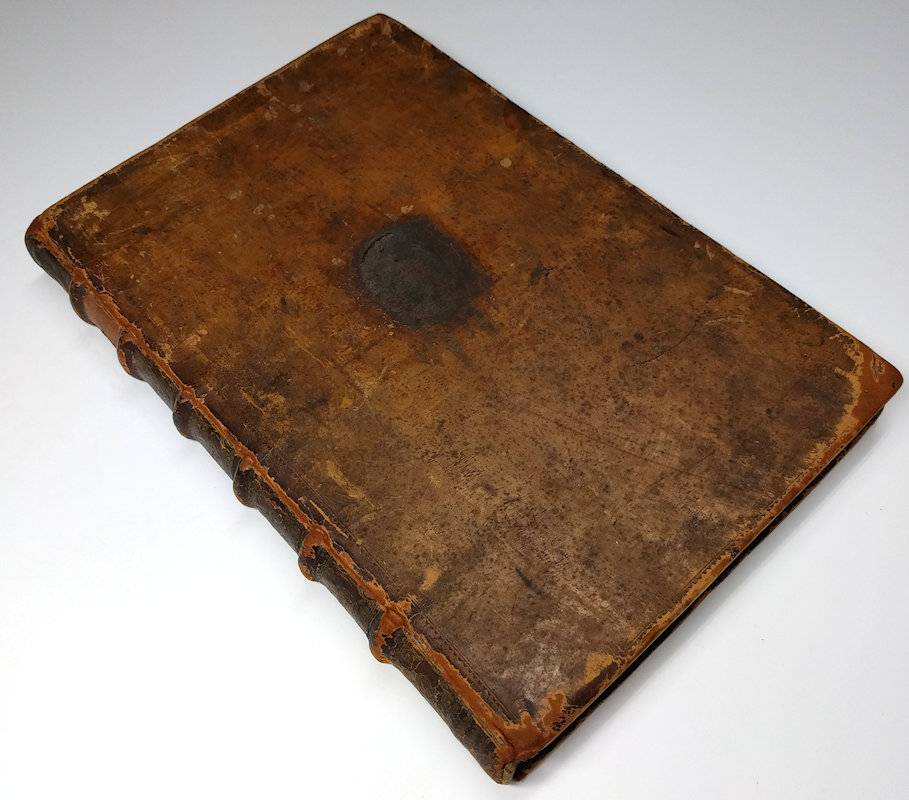PLUTARCHUS.
Opuscula Plutarchi Chaeronei sedulo undequaque collecta, & diligenter recognita, ac in unam faciem bellatule coimpressa, quorum ante praefationem patebit & numerus & series, praemisso quam amplissimo & rerum & verborum indice. Addita autem sunt nuper opuscula haec duo, De cohibenda iracundia & curiositate.
N.pl. (Paris), Vaenundantur in Officina Ascensiana, (1526). (Colophon at the end: 'Sub prelo Ascensiano ad Nonas Febru. 1526')
Small folio. (XIV),191 leaves. Contemporary leather. 31 cm (
Ref: BP16_104378; Renouard, Badius Ascensius 3, p. 175, no. 9; Hoffmann 3,198/99; cf Schweiger 1,264, ed. Paris, Asc. 1521; Graesse 5,362, Graesse forgot to mention the year 1526; Pettegree/Walsby 83345) (
Details: Spine with 6 raised bands. Gilt floral motives in the compartments. Ascensius's woodcut printer's device with the date 1520 on the title-page, surrounded by broad woodcut borders with some allegorical scenes. The short preface of Iodocus Badius Ascensius' is dated 1521. Ca. 60 big woodcut initials) (
Condition: Cover grazed, scuffed & soiled. Foot of the spine chafed. Red morocco shield in the second compartment partly gone. Gilt stamp in the centre of both boards erased and made unrecognizable, probably with sandpaper. Two old and faint ownership entries on the title. Below the printer's mark a small name has been erased, resulting in a tiny hole in the paper. Lower margin of the second half waterstained. Big stain on one leaf. Foxing near the end. Lacking the last blank leaf. Some old ink underlinings and notes) (
Note: The Greek philosopher, historian and educator Plutarchus of Chaeroneia was born before 50 A.D. and died after A.D. 120. He is our most important witness of the spiritual climate of the first and second century A.D. He wrote numerous short treatises of popular moral philosophy, which go under the general name of 'Moralia'. They include debating themes, works in the form of question and answer, and serious discussions of philosophical topics. His warm and sympathetic personality can be traced in many treatises, which contain also a great deal of antiquarian knowledge picked up by Plutarchus in the course of his wide reading. (H.J. Rose, A Handbook of Greek literature, London 1965, p. 408) The Moralia were very influential in the Renaissance. 'It is no exaggeration to say that Renaissance and early modern Europe discovered Greece and Rome through Plutarch's eyes'. (The Classical Tradition, Cambr. Mass., 2010, p. 748). Hoffmann mentions a great number of Greek, Greek/Latin editions, and Latin translations of (part of) the Moralia which were produced during the first half of the 16th century. The French publisher of Flemish origin Badius Ascensius (1462-1535), who was himself an accomplished Greek scholar, produced between 1503 and 1526 9 different editions of treatises of the Moralia, with translations of Erasmus and Guillaume Budé. The last one, this edition of 1526, has Latin translations made by Erasmus, Budaeus, Melanchthon, et alii. It copies the preceding edition of 1521, but adds at the end 8 leaves with 2 new treatises, 'De cohibenda iracundia' & 'De curiositate', both translated by Erasmus. The edition contains also short introductions to several treatises written by the leading scholars of that period) (
Provenance: 2 faint and illegible names on the title, one word recognizable as 'Anthonii')) (
Collation: â8, ê6, a-z8, A8 (minus A8, a blank leaf)) (Photographs on request)
Book number: 140127 Euro 1400.00
Keywords: (Oude Druk), (Rare Books), Altertumswissenschaft, French imprints, Greek literature, Griechische Literatur, Latin translation only, Moralia, Philosophie, antike altertum antiquity, classical philology, philosophy
 PLUTARCHUS.
PLUTARCHUS.

